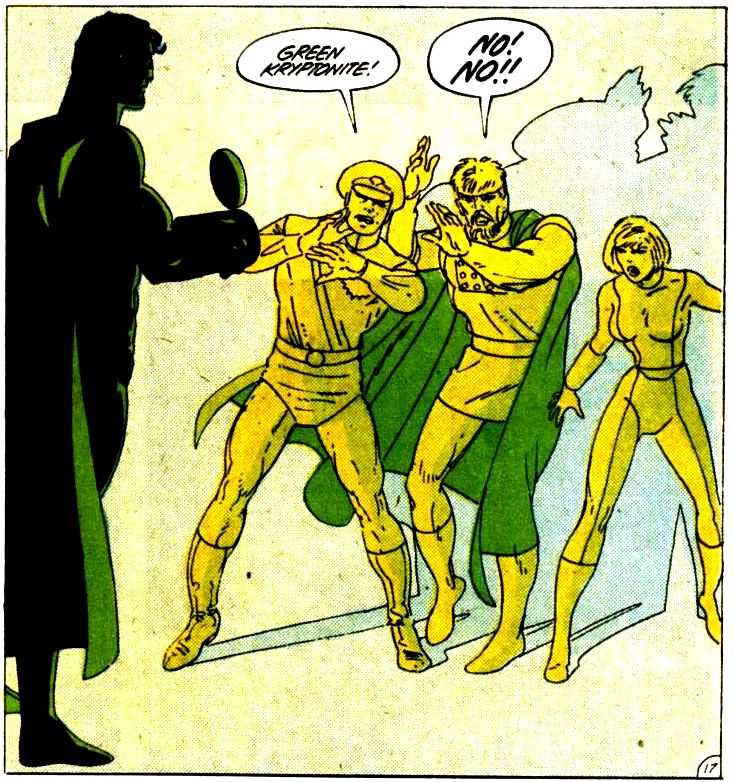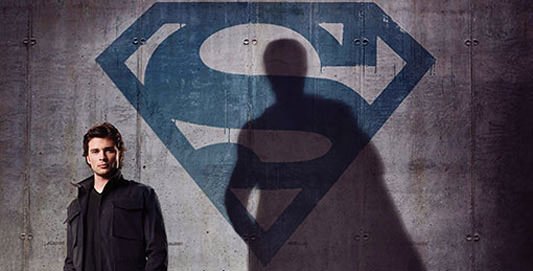 |
| Superman killing an alternate Zod and company with Kryptonite. |
Many of these edgier characters, like Wolverine and The Punisher, had no problem taking lives when the situation called for it. These tougher characters reflected the cynicism and uncertainty of the times and struck a chord with readers who could relate to deeply conflicted and consequently more human anti-heroes. Superman and Batman's refusal to kill even the most psychotic and homicidal of their enemies was initially a by-product of the comics code authority established in the fifties, which banned all heroes from killing and excessive violence. This made sense given that in the fifties and sixties, comics were almost exclusively enjoyed by kids and some illiterate adults. The industry was trying to clean up their image in the wake of Fredrich Wertham's assault on comics as having a corrupting effect on youth. Like everything else in the fifties, comics came to depict wholesome scenes of American life and uphold established values, no matter how false they might've been.
As with television and film, comics too have experienced a liberation, but heroes like Superman and Batman still maintain their "no-kill" policies. While I think this is a noble thing to uphold, as an "adult" reader of comics, or at least a man-boy reader of comics, I often think that the rigidity of this rule makes no sense. Comic books are not only just for kids anymore, they're not mostly for kids these days. Books like Watchmen and Sandman, just to name a few, tackled mature, complex issues that couldn't even have been acknowledged a few years prior. In recent years, comic books have begun injecting much more realism and grittiness into their worlds, with arguably mixed results. Comics, especially superhero comics, are still largely based in fantasy and should never lose that quality of imagination and wonder, but it's refreshing to see some of these fantastic concepts being grounded in a world that seems similar to our own.
It's no secret that our world is sometimes faced with dangers that threaten many lives. The world seems more like a comic book than ever before. No longer are twin skyscrapers plummeting to the ground limited to the machinations of comic book villains. Threats like these are part of our daily existence and our real life superheroes, the cops, firefighters and military personnel that we depend on must sometimes use deadly force to neutralize these deadly threats. We don't think less of the cop who's forced to shoot and kill a gunman who opens fire on innocent people. We didn't think any less of the cops who shot and killed the older of the two brothers who committed the Boston Marathon bombing, so why should we think less of imaginary heroes like Superman and Batman. Just because they're fictional, doesn't mean they should be flawless. I'm not saying that these characters should just kill when they feel like it the way Rorschach does in Watchmen, although ironically, Rorschach seems to be most people's favorite Watchmen character. I think in our modern world, what makes Superman a hero is his ability to do the hard thing no one else is willing to do for the greater good. Unlike Wolverine or Punisher, the times that Superman was forced to kill, and there've been a few in the comics, he's haunted by his decision. In an interview with Todd McFarlane, creator of Spawn, he mentions that he never really got into Batman because it made no sense to him why he didn't just kill The Joker and have done with it. The common fan-boy response is that Batman refuses to sink to Joker's level, but he's still got a point. Villains like the Joker never change their ways and by simply throwing them back into Arkham, you could argue that Batman has some indirect responsibility for all the lives Joker takes the next time he inevitably breaks out or is released, having conned them into believing he's cured. In the comic book world, writers have to find ways to bring great villains like Joker back for seconds and thirds, but the logic just isn't there.
In Superman's case it's even worse, because his super-powered villains are always sure to escape imprisonment and wreck havoc again, but on an even larger scale.
Of course, this brings me to Man of Steel and the neck snap heard round the world. I think people made way too much of what Superman did. Like Joker, Zod is a villain who refuses to give up. Being a warrior bred for combat, he's determined to fight to the death to achieve his goal, which happens to be worldwide genocide. Unlike the Joker however, Zod has Superman's godlike powers and not a shred of his morality. No prison can hold him, there's no kryptonite to subdue him and Supes can't just open up another black-hole and toss him in, but even if he did, who's to say that isn't a death sentence. Given the choice between eternal living death in a phantom dimension and having my neck snapped, I'd choose neck snap and I know Zod would as well. Now, I'm in no way saying Superman should start snapping necks if his enemies surrender or even if he gets the upper hand in battle. Even a badass like Wolverine usually won't kill an adversary if they surrender to him. All I'm saying is that in the midst of battle when innocent lives are at stake and a hero has no choice, at least none that won't cause greater death, but to kill a monster hell bent on wiping out every last human, then killing seems justified. Nobody bats an eye when Wolverine shish-kebabs scores of men in the heat of battle, and although Superman is supposed to be much more pure of heart, you can't say that Wolverine doesn't have a heart or a conscience as well. The guilt Superman carries even for killing monsters like Zod just proves that he's still got a conscience better than just about anyone. If comic book fans hope to disprove the notion that comics are just kid's entertainment, they should stop clinging so tightly to inflexible and often illogical concepts designed to keep comics just for kids. Superhero comics should never lose the magic and essential "goodness" that speaks to the kid in all of us, but despite our desire to see it that way, the world isn't simply black and white and knowing what's truly right is often hard to know. There should be room in these comics for the characters to grow and take on real dimension and depth for fans who want to imagine what might happen if these heroes existed in the world as we know it. Although morality isn't simply black and white, we can still hope that heroes, whether fictional or real, will always do what they think is right for the greater good, even if it means making the choice that no one else can make.








